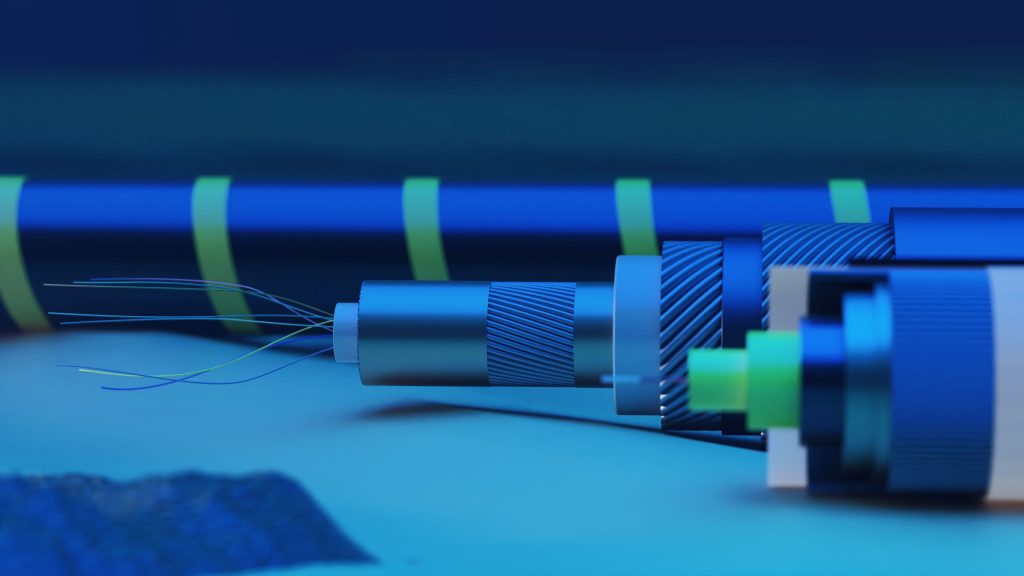Public-private consortium develops pioneering system for the protection and maintenance of submarine cable networks
-
The submarine cable system has been devised by a public-private consortium comprising AFR-IX telecom, the University of Alcalá, the Institut de Ciències del Mar (ICM-CSIC) and Aragón Photonics.
-
The project is funded by the Spanish Ministry of Science and Innovation and the NextGenerationEU/PRTR programme of the European Union.
-
The technology to be developed in the project has an important environmental aspect, since the continuous monitoring of the cable will also make it possible to detect earthquakes, submarine landslides, tsunamis and to study the location of and track marine mammals.
Barcelona, 17 January 2022 – Submarine cables handle 98% of international Internet traffic. They are essential for secure communication and financial transactions. Despite their security, effective maintenance systems are crucial for operation and incident management, such as ship anchor strikes.
AFR-IX Telecom and Partners Develop Key Maintenance System
AFR-IX Telecom, the University of Alcalá, the Institute of Marine Sciences (ICM-CSIC), and Aragón Photonics are developing a critical system. This public-private consortium has created a predictive maintenance system (PSI) for submarine cables. The system uses Distributed Acoustic Sensor (DAS) technology to detect potential damage early. It also converts submarine cables into large offshore seismic sensor arrays.
Application and Benefits
AFR-IX Telecom will apply this system to its Medusa submarine cable. The Barcelona Cable Landing Station, opening in early 2022, will store real-time data. The University of Alcalá brings expertise in DAS research. ICM-CSIC specializes in seismological and oceanographic software. Aragón Photonics provides high-performance acoustic sensing (HDAS) equipment.
Funding and Support
The project, funded by the Ministry of Science and Innovation and the NextGenerationEU/PRTR programme, has a budget of €1,446,136.92.
Pioneering system based on DAS technology and artificial intelligence
The new monitoring system uses DAS technology for submarine cable infrastructure. It includes a high-fidelity fibre interrogator (HDAS). This device records small deformations in optical signals along fibre optic cables. Additionally, an artificial intelligence (AI) system analyzes HDAS data. It provides intelligent interpretations of potential threats and seabed environmental changes.
This system enables continuous analysis of natural and man-made threats. It generates early warnings for preventive action, offering an innovative maintenance approach for submarine cables.
Norman Albi, CEO of AFR-IX Telecom, says, “This system enhances network resilience and reduces submarine cable repair costs.”
DAS technology enables underwater seismic measurements. It helps understand tides, ocean currents, and meteotsunamis, like those from meteorological sources. Recently, HDAS equipment monitored seismic movements of the Cumbre Vieja volcano on La Palma.
At last, DAS technology can monitor marine ecosystems. It tracks cetaceans, aiding in their protection and habitat conservation.
Medusa and Barcelona CLS, key elements of the Project
To apply the technology of the pioneering monitoring system, AFR-IX will facilitate the use of its future submarine cable Medusa, which will link nine Mediterranean countries and will be operational in 2024.
Specifically, in order to develop the intelligent monitoring system, access to the Medusa submarine cable will be provided from the cable landing stations in Barcelona (Barcelona Cable Landing Station –CLS – promoted by AFR-IX), Torreguadiaro and Zahara de los Atunes, and other possible landing points in countries of the European community.
From each landing station, high-capacity routers will provide a high-speed network. The Medusa submarine cable system network will transport real-time DAS data to Barcelona CLS. There, the University of Alcalá will process the data. Meanwhile, the 24/7 Network Operation Centre team will ensure both the operation and security of the network at the cable station sites and Barcelona CLS. Consequently, data analysis will continue without interruption
PSI project ref. PLEC2021-007875, funded by:

About AFR-IX telecom

AFR-IX Telecom, founded in 2013 and headquartered in Barcelona, operates as an infrastructure and telecommunications provider. It owns the Medusa submarine cable and the Barcelona Cable Landing Station. The Barcelona Cable Landing Station, an open port expected to start operations in the first quarter of 2022, aims to become a leading digital port in the Mediterranean with a capacity for up to eight submarine cables. Additionally, AFR-IX holds telecommunications licenses in Portugal, the USA, and several African countries, including South Africa, Nigeria, Ghana, DRC, Mali, Burkina Faso, Sierra Leone, Niger, and Cameroon.
About Aragón Photonics

Aragón Photonics Labs S.L.U. (APL) specializes in developing, manufacturing, and commercializing high-performance test and measurement equipment using optoelectronic and photonic techniques. Founded in 2004 as a spin-off from the University of Zaragoza, APL focuses on creating, producing, and marketing its patented high-resolution optical spectroscopy device, known as BOSA.
About Universidad Alcalá

The team of the University of Alcalá (UAH) participating in this proposal is formed by members of two research groups of the Department of Electronics of the UAH: the Photonics Engineering Group, GRIFO, and the Group of Electronic Engineering Applied to Intelligent Spaces and Transport, GEINTRA. These two groups have collaborated in previous projects related to the area of research involved in this proposal.
Both research groups have been recognised as a “High Performance Group” in the UAH, given their high scientific production.
About Institut de Ciències del Mar (ICM – CSIC)

Institut de Ciències del Mar (ICM) in Barcelona is the largest marine research centre of the Spanish National Research Council (CSIC).The ICM consists of specialists in various aspects of oceanographic research. To enhance our understanding of the ocean and its impact on planetary health, researchers at the ICM conduct cutting-edge studies. Their work focuses on ocean and climate interactions, marine life and ecosystem conservation, and mitigating the impacts of natural hazards and human activities. In 2020, the ICM received the Severo Ochoa accreditation for Excellence. This award underscores the institution’s leadership in marine research in Spain and highlights its commitment to generating social impact.
Contact for information: Andrea Guinó, aguino@afr-ix.com





